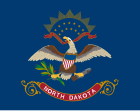 |
|---|
| Constitution |
The politics of North Dakota were shaped historically by early settlement by people from the Northern Tier, who carried their politics west ultimately from New England, upstate New York, and the Upper Midwest. The area and state also received numerous European immigrants and migrants, particularly during the era of opening up of former Native American lands for sale and settlement.
The political leanings of the state since its creation have been largely conservative. However, there has also been a vein of political progressivism within the state's history, particularly with populist efforts to gain better conditions for subsistence farmers. The left-wing Nonpartisan League (NPL) was a strong political force during the first half of the 1900s. In the 1920s many NPL candidates were elected to government offices and the party enacted its largely center-left programs, including establishing state-owned banks, mills, and a railroad. Today, the major political parties in the state include the Republican Party and the North Dakota Democratic-NPL Party, the latter of which was formed by the merger of the NPL and the North Dakota Democratic Party in 1956. The state's Republican Party controlled the state government in its early days. In the early 21st century, Republicans control nearly all of the statewide officials.
The government of the state was modeled on that of the United States federal government, whereby the Governor of North Dakota is executive head of state and head of government. Legislative power is vested in both chambers of the North Dakota Legislature; the House of Representatives and the Senate. Judicial power is vested in the North Dakota Supreme Court, which is independent of the executive and the legislative branches. The North Dakota Constitution was approved in 1889.